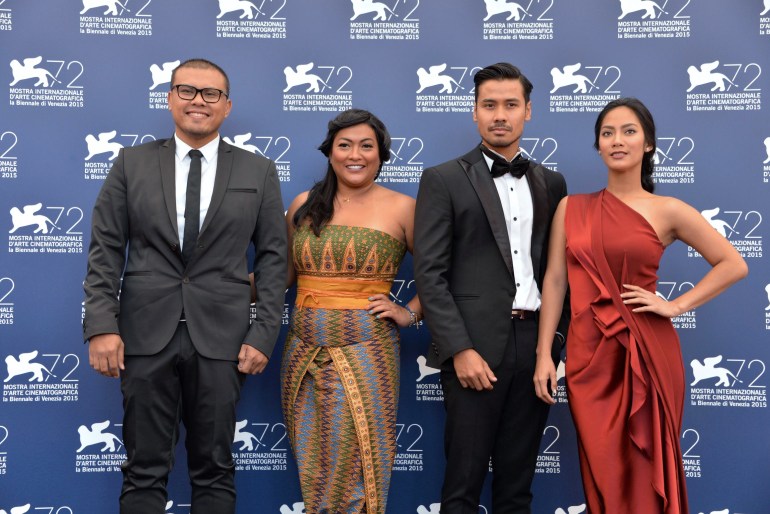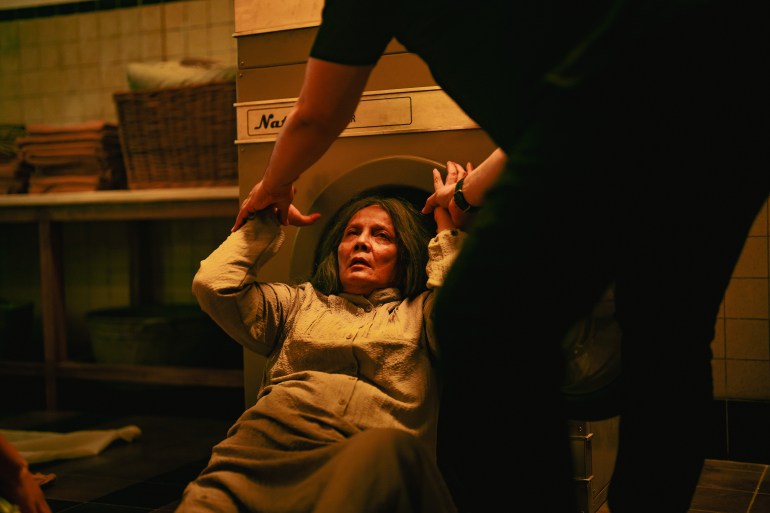Medan, Indonesia – Indonesian film director Joko Anwar is a busy man.
He is on location in the city of Bandung, shooting “a new project”, the details of which he refuses to divulge, while also wrapping up post-production on another film to be released “soon”.
At the same time, he is doing press for his latest smash-hit horror flick Siksa Kubur (Grave Torture), which was released in Indonesia on April 11 and has already sold almost 4 million tickets – putting it on track to join the top 10 highest grossing Indonesian films of all time.
“Can you give me 10 minutes,” he apologises about 20 minutes into the phone interview, having said that he was on set but not that he was actually between takes. “I just need to shoot this scene.”
It is perhaps no surprise that Anwar, one of Indonesia’s most celebrated film directors, is good at multitasking – particularly if the rave reviews of Siksa Kubur, which he wrote, directed and marketed, are anything to go by.
The film tells the story of a young girl Sita (played by Widuri Puteri) and her brother Adil (Muzakki Ramdhan). It begins in 1997 when the siblings witness their parents, who own a bakery, die in a suicide bombing.

The bomber, who steps into the bakery moments before detonating the bomb, plans to die as a martyr – believing he will go straight to heaven and avoid being tortured in his grave.
“The concept of grave torture does not exist in other religions – it is uniquely Muslim,” Anwar explained.
“Muslims believe that, when you die, you will be questioned by two angels about your life. If you don’t do well, you will be tortured in your grave.”
After watching her parents die at the hands of a man who believes he can evade sin even as he murders innocent bystanders, Sita becomes obsessed with proving that grave torture does not exist and that religion is primarily a form of fear-mongering.
It is a sensitive topic in Indonesia, where almost 90 percent of the country’s 270 million people are Muslim, but Anwar, himself a practising Muslim, says that he did not want the film to be “judgemental”.
“We tried to treat the topic with the greatest respect and not disparage anyone. We were just throwing out questions and hoping that there would be a discussion. We wanted the film to be an experience that led to reflection,” he said.
The idea for Siksa Kubur was percolating in Anwar’s mind for “a long time” before it came to fruition.
“I wanted to examine the relationship between religion and people. Since I was a child, I have had questions about belief and religion, which I tried to explain to the audience through these characters.”
One of these characters is the head of the Islamic boarding school that the orphaned Sita and Adil attend, and who abuses the young boys in his care.
Anwar wrote the screenplay following a series of high-profile cases of abuse at religious institutions across Indonesia, including Muslim and Christian schools.
“Teachers at religious schools use religion as their identity, so I wanted to ask the question: Why are they doing that then?” he said.
“The theme of abuse at religious institutions was based on a very relevant issue in Indonesia.”
‘Gotham City’
Like Sita and Adil, Anwar’s childhood was difficult.
He was born in 1976 in the city of Medan, the provincial capital of North Sumatra.
His father worked as a pedicab driver, a backbreaking job riding a bicycle with a passenger cab around the densely populated city, while his mother sold fabric in a local market.
Anwar grew up in what he describes as “a slum named Amplas”.
Located in the heart of Medan, Amplas is the city’s main transit terminal, clogged with long-distance buses ferrying passengers across Sumatra and beyond.

Like many transit hubs, Amplas has long had a reputation for a certain amount of vice, filled with pickpockets and ticket touts, grifters and traffickers – serviced by open-air shacks that offer a cheap local moonshine made from the fermented sap of toddy palms.
Across the rest of Indonesia, Medan also has a nickname: Gotham City, after the crime-ridden metropolis in the Batman comics.
Anwar, a comic book fan, laughs when reminded of the moniker and agrees that Medan is a tough place to live. Amplas, in particular, he says, was “not conducive to a child”.
By the age of 14, the majority of Anwar’s peers were either “in prison, married because they got someone pregnant, or consumed by drugs and crime. I escaped by watching films”.
From the age of six, Anwar would make an arduous 45-minute journey on foot to a rundown “bioskop rakyat” (community cinema), which sold cheap tickets for local Indonesian films and kung-fu movies from Hong Kong.
Sometimes, he had the few rupiahs he needed for a ticket and could go inside, but at other times, he did not have enough or the sellers refused entry to a child on their own. On those occasions, Anwar would stand on his tiptoes and peek through the ventilation shaft of the cinema, which did not have air conditioning and was cooled by fans.
“That way, I could see about three-quarters of the screen, and I discovered that there were different worlds other than my own,” he recalled.
His dream of attending film school, however, proved elusive when his parents could not afford the fees, and instead, Anwar went to the Institute of Technology in Bandung where he studied aeronautical engineering before becoming a journalist and film critic for the Jakarta Post.
Once there, he interviewed filmmaker Nia Dinata, who helped him get hired as an assistant director for the 2003 film Biola Tak Berdawai (The Stringless Violin).
In 2003, Dinata and Anwar co-wrote the satire Arisan! (The Gathering!), which the director describes as “the first film in Indonesia to depict homosexual relationships in a positive light” and won awards at the Bandung Film Festival, the Citra Awards and the MTV Indonesian Movie Awards.
The accolades kept coming.
In 2005, Anwar made his directorial debut with Janji Joni (Joni’s Promise), about a film reel delivery driver named Joni (Nicholas Saputra) who meets a girl who will only reveal her name if he successfully delivers a film reel while racing through Jakarta’s notorious traffic.
In 2009, Anwar released Pintu Terlarang (The Forbidden Door), which TIME Magazine film critic Richard Corliss said could be “Anwar’s calling card for international employment, if only Hollywood moguls wanted something out of their own narrow range”.
His fifth feature film, A Copy of My Mind, was the only film from Southeast Asia to be screened at the 2015 Venice Film Festival and, in 2019, his superhero movie Gundala premiered at the Toronto International Film Festival.
In 2020, Anwar’s folk-horror film Impetigore was announced as Indonesia’s official submission to the 2021 Academy Awards.

Christine Hakim, an actor, producer and activist often referred to as the “grande dame of Indonesian cinema”, has been acting since 1973, and worked with Anwar for the first time on Impetigore.
“He’s amazing, very special,” the 67-year-old told Al Jazeera. “I was not a horror film actor when I met him. I don’t like jump scares and I don’t like horror films,” she said, laughing.
But a chance meeting in a hotel lobby, during which Anwar pitched her the part, changed her mind.
“I knew he was one of the best directors in Indonesia, which is why I agreed,” she said.
When Hakin saw the script for Impetigore, she says she was astonished.
“In my 40 years working in the film industry, there had never been a director who had written the entire backstory of my character for me. Usually, as an actor, I had to interpret and find that myself, doing all my own research,” she said.
“I thought he was so serious.”
Hakim also has a role in Siksa Kubur, in which her character dies after becoming entangled in a washing machine that spins out of control.
Originally, Hakim’s manager tried to break the news about the washing machine gently.
“Of course, I started screaming. I said, ‘Are you joking? I’m too old for this’.”
Yet when she read the rich and complex script – which tells the story of Hakim’s character suffering a dreadful psychological blow that requires her to “dig deep to concentrate and find the level of stress required” – she changed her mind
“I knew Joko wouldn’t do anything to put me in danger and I felt comfortable after he explained the role to me in detail,” she said.
“I don’t think I would have ever considered acting in horror films had it not been for Joko.”
A film fan
Is there an overarching theme in Anwar’s films, from the upbeat highs of Janji Joni to the shadowy depths of Siksa Kubur?
He says there is: family dynamics.
“I always want to examine what happens if you have a ‘good’ family or a ‘bad’ family and how that plays out in society,” he explained.
As the youngest of three siblings, with an older sister and brother, Anwar says he “grew up without a father figure”.
“My father basically never talked to me. It was a dysfunctional family, but I survived and used it as my inspiration. I hope, in turn, to inspire others. In the end, it was a blessing in disguise,” he said.

Anwar’s mother died in 2009 and his father the following year, having both lived to see some of his success, although they struggled to understand his films.
“We didn’t talk about them,” he said. “They were always busy and left me to my own devices. They never stopped me from doing anything, but they didn’t praise me either.”
Thomas Barker, an honorary associate professor at the Humanities Research Centre of the Australian National University, who specialises in the cultural sociology of Southeast Asian screen industries, describes Anwar as “a unique personality in Indonesian cinema”.
“The development of his career and his work traces the development of the Indonesian film industry itself over the past 20 years. He’s also a film fan, meaning he has a lot of film knowledge to draw on and this is evident in his work.
“I think this gives his work a cinematic depth and intertextuality. He understands the form of cinema and can pull in ideas from a whole range of sources.”
He adds that Anwar is “helping to elevate Indonesian cinema in a way that makes it more palatable to an international audience”, which can be demonstrated through his success at international film festivals and his work for international companies and global streaming services.
“This is not an easy skill, especially in horror which can be quite specific to a culture in terms of its characters, fears and monsters,” Barker said.
Of all his work, Anwar is most proud of Siksa Kubur, which he describes as his most personal film as well as the one that has elicited the most discussion.
“Audiences have had so many theories about the film and what it means, because we didn’t give it a neat conclusion and left it up to them.”
While Anwar is still riding high on the success of Siksa Kubur, he also has an upcoming Netflix series named Nightmares and Daydreams that tackles a rare genre in Indonesian cinema: science fiction.

Anwar says the Indonesian film industry has one of the biggest potential markets in the world, although some skills are still lacking.
“We need more film schools, because lots of people want to enter the industry and don’t know where to study,” he said. “We need more film schools across all of Southeast Asia.”
Despite the hurdles, the industry continues to grow, which Anwar sees as “a good sign commercially”.
Asked if the Indonesian film industry is in good health, he pauses before answering.
“I wouldn’t say that the Indonesian film industry is in good health,” he said.
“It would say it is extremely healthy.”









